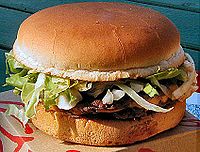
Image courtesy of Wikimedia Commons
What’s making American kids fat? Some blame food deserts, while others implicate fast-food restaurants, lack of exercise, or poor parental eating habits. But a few recent studies seem to suggest that the childhood obesity epidemic may be more complicated than we thought.
In the New York Times, Tara Parker-Pope reports that among kids under 13, burgers and fries are out, while yogurt, soup, and grilled chicken are in. This, she says, is good news:
To be sure, pizza, burgers, fries and kids’ meals are still the most popular items ordered by children; the percentage gains for items like soup and yogurt are from a smaller base. But the trends bolster an argument that children’s health researchers have made for years: if you offer more healthful food, kids will eat it.
But will they? Another recent study suggests that parental eating habits actually have little to do with kids’ food choices. And according to a study released today by the Indiana University-Purdue University Indianapolis, household proximity to fast-food restaurants doesn’t have much bearing on whether a child is obese, either. (And get this: The Purdue researchers found that living near a gym or rec center was actually associated with weight gain.)
So, what to make of these counterintuitive findings? While any one of these factors might not explain childhood obesity on its own, it’s also not realistic to think of them as existing in a vacuum. Instead, they act in concert, along with other variables, like genetics. It’s not totally out of the question that a kid who is genetically predisposed to obesity might also live near McDonald’s and watch his dad eat Quarter Pounders three times a week. A wholistic study that figures out which factors matter most, and how they interact—that’s a tall order. It’d take a long time, and a whole lot of research power to boot.
Till that happens, is it really useful to isolate these variables? Post your thoughts in the comments.
















